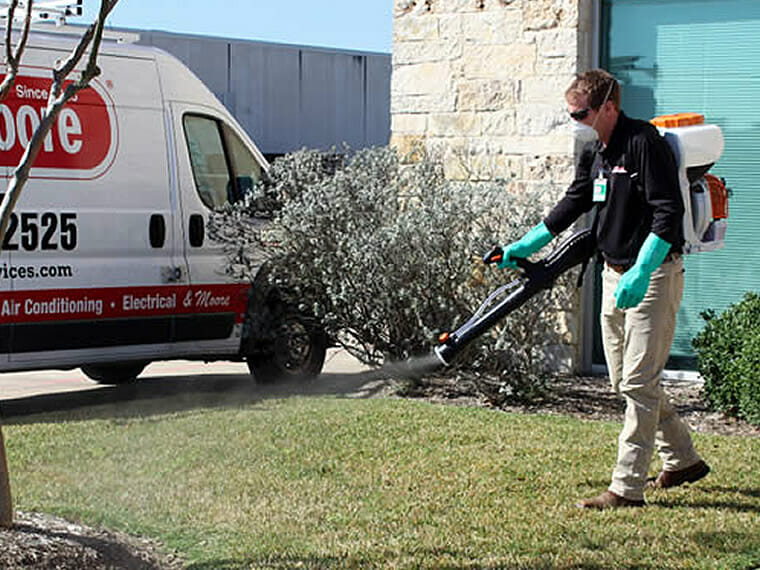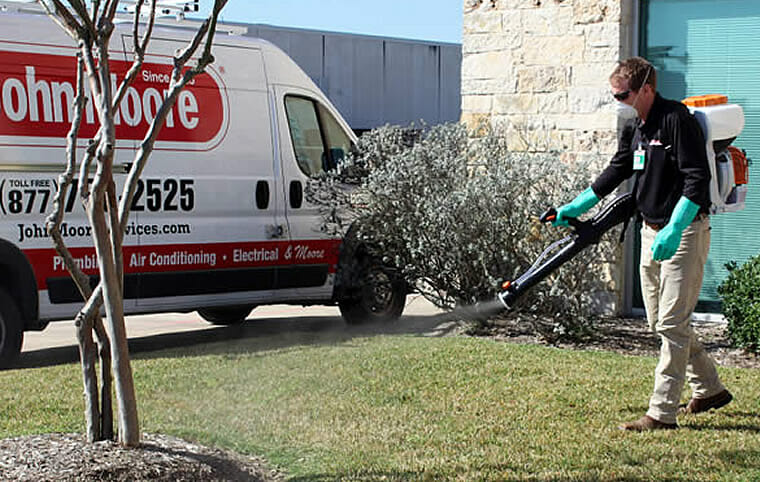
Pest Control Training
John Moore Pest Control Training
Pest control covers a lot of territory and a lot of pests. At John Moore, we train our team to be ready for anything. We keep a wide variety of pests out of homes, backyards, farmlands, schools, manufacturing plants, restaurants, hotels, office spaces— essentially anywhere they can get in, cause damage, and spread germs and diseases. We prevent rodents from getting into food, spreading fecal matter, and chewing up siding, walls and wires. We prevent termites from chewing through wood and foundation. We stop ants from spreading in yards and fields. We keep flies, roaches, and gnats out of restaurants and schools. We kick bed bugs out of beds, sanitize infected floors and insulation, and ensure that every hole, crack, and entry point is covered so that pesky rodents and insects can’t easily find their way back inside.

Pest control technicians not only need to know about pests— how they look, what they leave behind, how they breed, the diseases they carry— but also need to know how to work safely with traps, chemicals, and exclusionary practices. We also need to be good at communicating with our clients. (This is a service job, after all).
Whether we’re working with homeowners or businesses, it’s important for us to listen to our customers so that we can best meet their needs. Are there pets and children in your home? What areas of your manufacturing facility need to be clean and chemical free at all costs? What hours does your business operate? What audits does your business adhere to? These are the kinds of questions we ask in order to strategize the best plan of action for the people we serve.
Professional pest control can be a lot to juggle. To be able to work with homeowners, work with businesses, create and execute pest control plans, and earn the title of “professional”, we put in a lot of work up front and never stop learning.
Trials of the Pest Control Professional: Licences
Besides the skills and know-how to send pests packing, professional pest control techs all have something to show for their training: licenses.
Like karate belts, licenses have different ranks, and we work our way up. In Texas, these licenses are regulated and distributed by the Texas Department of Agriculture. In other states, their Department of Agriculture or similar agency distributes licenses.
These licenses are referred to as SPCS licenses, which stands for Structural Pest Control Service license. Anyone who plans on removing pests from a structure of any kind, be it a building or landscape, needs an SPCS license from their state’s department of agriculture.
The primary licenses are:
- Apprentice License
- Commercial Technician License
- CA (Certified Applicator) License
In addition to these licenses, there are several license categories that can be acquired to broaden the services that a pest control technician can offer. These license categories can be applied to any of the above licenses.
License categories are:
- General Pest Control
- Lawn and Ornamental
- Termite
- Structural fumigation
- Commodity fumigation
- Weed control
- Wood preservation
What Each License Means & What it Takes to Earn It
In order to acquire each pest control license, pest control technicians must first undergo training and pass a test. As we work our way up through the ranks of apprentice, technician, and applicator, we can work more independently, and eventually, lead and train other pest control technicians.
Here’s a rundown of what’s required to obtain each license and what kind of work each license allows a pest control technician to undertake:
| License | Requirements | Ability |
|---|---|---|
| Apprentice License |
|
|
| Commercial Technician License |
|
|
| Certified Applicator License |
To apply for a CA License, you must have completed at least one of the following:
In addition, you must also pass a Certified Applicator License Exam by the Texas Department of Agriculture |
|
What About License Categories?
As mentioned earlier, anyone training to receive their pest control license can learn how to provide pest control for various categories. As soon as someone decides to get their apprentice license, they can take classes in different categories to focus on controlling different types of pests and providing various pest control services.
Here’s what each category means:
Pest Control
Termite Control
Lawn and Ornamental
Commodity Fumigation
The Commodity Fumigation category allows for the fumigation of structures containing food or other commodities. You also need an Agricultural Pesticide Applicator license.
Weed Control
Wood Preservation
Structural Pest Control Business License
While we just about covered every license that applies to pest control professionals in the State of Texas, there is one final license that companies need to have in order to offer any pest control services: a Structural Pest Control Business License.
This license allows a business to hire, train, and recruit professional pest control technicians; solicit their services; perform inspections; write estimates; and perform outstanding pest control service in a legal manner.
In order for a company to obtain their pest control business license, they must be insured and have at least one professional holding a Commercial Applicators license to oversee commercial technicians and apprentices.
John Moore is Committed to Pest Control Professionalism
While professional pest control requires a lot of training, licenses, and continued learning, we know that it’s worth it if it means we can safely provide the best quality of service possible to our clients.
If you’re interested in joining the John Moore Pest Control team, you can apply on our careers page.
If you are a homeowner or business that needs quality pest control services, contact us by calling (713) 730-2525
Share this Post
